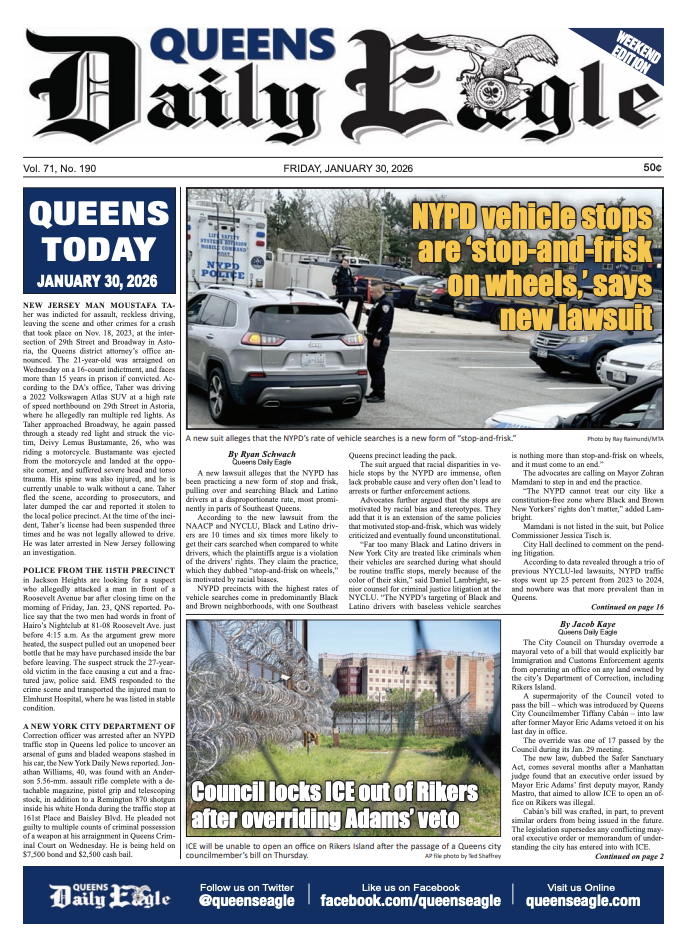Court reverses 2013 child sex abuse conviction, sending case back to Queens Supreme
/The Second Department, Appellate Division courthouse. Eagle file photo by Rob Abruzzese.
By David Brand
A state appellate court reversed the 2013 child sex abuse conviction of a former public school teacher, reasoning that the judge presiding at the jury trial allowed prosecutors to question witnesses about complaints that were not part of the original indictment, prejudicing the jury.
Simon Watts, an elementary school teacher, was arrested in 2010 and charged with several counts of sexually abusing and endangering the welfare of children — his students. He was specifically accused of forcing 8- and 9-year-old students to touch his penis on multiple occasions and he was convicted in 2013.
In 2018, one of Watts’ victims won a $16 million verdict in a civil lawsuit against the Department of Education and the city, which was later decreased to a $4 million settlement. Though the Appellate Division reversal sends the criminal case back to Queens Supreme Court, a city Law Department spokesperson said the reversal “has no legal impact on the settlement.”
The Second Department, Appellate Division reversal hinged on whether defense counsel “opened the door” for the prosecution to question witnesses about the uncharged complaints — other alleged instances of sexual abuse — and pending civil litigation.
During a pretrial conference, the Queens District Attorney’s Office said it would not bring up any alleged uncharged complaints against Watts. Prosecutors also contended that defense attorneys should not be able to argue that other cases were dropped from the indictment because of credibility issues. Both strategies could effectively prejudice the jury.
Before jury selection, Justice Michael Aloise said that if defense counsel brought up the civil lawsuits or uncharged complaints, he would allow prosecutors “to explore any factor that’s the impetus for the lawsuit” during redirect examination of prosecution witnesses.
A defense attorney did reference lawsuits and uncharged complaints in her opening statement and during cross-examination, which, Aloise ruled, opened the door for prosecutors to question witnesses about additional sex abuse complaints that were not part of Watts’ indictment.
The jury convicted Watts and he was sentenced to 35 years in prison.
A panel of four Second Department judges ruled that the jury verdict was not against the weight of evidence — there was sufficient evidence to prove Watt’s guilt, they said.
They disputed, however, Aloise’s ruling that defense counsel mentioning civil lawsuits or uncharged complaints would allow prosecutors to bring up “any factor” that informed the lawsuits, even if they weren’t part of the criminal charges or mentioned during cross-examination.
Aloise, they said, “erroneously permitted the introduction of highly prejudicial alleged uncharged complaints and deprived him of a fair trial.”
A spokesperson for the Office of Court Administration said the reversal “simply reflected the Appellate Division’s disagreement with the trial judge over the fact-driven question of whether the defense attorney ‘opened the door’ to evidence of uncharged additional sexual misconduct by eliciting testimony that several of the victims had filed a lawsuit against the defendant and the School District.”
The case now returns to Queens Supreme Court, where Watts will face a new trial. A spokesperson for the Queens DA said the office is “still evaluating our decision and looking at our options.”
“As with all victims, we handle each proceeding on a case by case basis,” the spokesperson said. “This is a sensitive matter and we will do our best to make sure our victims are protected.”




